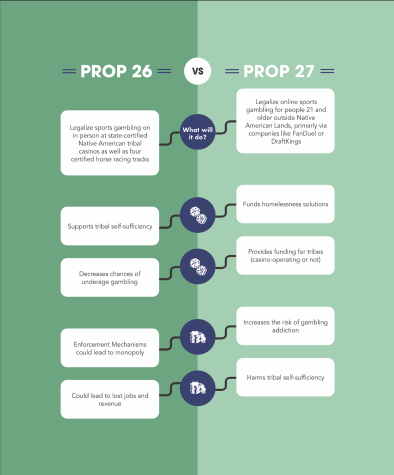California: Taking a Gamble?
During midterms, California voters will decide whether to legalize sports gambling via either Proposition 26 or Proposition 27. These two measures are complicated and deserve an in-depth overview.
October 11, 2022
Steve Delaney, a recovering sports gambling addict in New York state, read aloud on his podcast a message from an online gambling-support group: “Please pray today for one of our brothers. He took his own life due to this insidious disease [of gambling]. He leaves behind three teenage boys. They are but for the grace of God.”
Delaney, the host of “Fantasy or Reality? The GPP” (Gambling Problem Podcast), speaks openly about the dangers of sports gambling and the negative effects that it has had on his life and the lives of others
“All it did was deliver crushing guilt and despair more horrible than [my] worst nightmare,” Delaney said. “I felt so isolated when I was in my gambling. This disease is so serious that now there’s a family and children and teenage kids that don’t have their father anymore because of [it].”
He says on his podcast that his main method of placing bets was using the major online betting company DraftKings. He states that the ease of accessibility online largely facilitated his addiction, and that, if legalized, online gambling could pose a serious threat to others.
“I’m sure there’s going to be a whole new wave of gambling issues in NY state and wherever else this becomes legal,” Delaney said.
Delaney’s worries about online sports betting becoming legal will soon be an issue on California ballots.
Currently, California’s voters are seeing a barrage of ads in favor of, or opposing both Proposition 26 and Proposition 27.
Proposition 26 would legalize sports betting in-person only, at Native American casinos and at four horse racetracks in California. Proposition 27 would legalize online sports betting for people 21 years or older and would also impose a 10% tax on sports betting revenues. This money will go into a fund directed toward (among other things) fighting homelessness in the state. To learn more about these propositions, read the infographic below.
How did this question of gambling end up on your ballot? In 2018, the Supreme Court ruled that states could make the decision to legalize sports betting. Since then, 35 states have legalized it, according to CalMatters. Now, California is making the move, although not for the first time; in 2020, CA lawmakers were working on a deal to legalize, but they did not finish it in time for it to be seen on the ballot.
Currently in California, online betting is illegal for all sports events except horse racing. Most other gambling is generally only allowed in Native American casinos and card rooms. Because these casinos are on land with tribal sovereignty, the states does not have the jurisdiction to prohibit gambling, as classified by the Indian Gaming Regulatory Act of 1988.
Currently much of the discussion surrounding these laws is about profit: how much money will be brought in and where it will go? This worries Delaney.
“It seems like California, just like many other states, only cares about the tax revenue that will be brought in and is not thinking about potential long-term damage … and is doing very little to nothing to address it,” Delaney said.
Currently, the California Council on Problem Gambling reports that 1.5% of California adults are disordered gamblers now (meaning they frequently gamble and lack control over their gambling). However, this data was collected from an analysis in August of 2006, so the actual current scope of this problem is only vaguely known. Delaney fears the scope of said issue with increase with legalization,
“It’s kind of scary right now with the sports betting expansion; I just feel like there are going to be a lot more people that [will] have a problem with this,” he said.
By legalizing [gambling], you are inevitably going to create harm.
— -Steven Delaney
The National Council on Problem Gambling reports that the rate of sports bettors developing gambling addictions is twice as high compared to bettors playing chance-based games.
Sports betting is unique in the way that bettors often believe that their skill and knowledge of sports will translate to higher rates of success. Although sports bettors may bring marginally higher winning rates than other forms of pure chance-based betting like roulette or the lottery machines, this facade of skill-induced wins over-inflates the perceived monetary gain.
According to the Professional Gambler Newsletter, even for a professional sports bettor, the average long-term winning percentage is seldom over 55% and often can be as low as 53% (compared to 50% winning chances on roulette). The misconception of skill translating to an unrealistically high win rate for sports bettors incentivises them to come back more often. This sustained practice can often lead to gambling addictions and other problems over time.
An anonymous Paly student that participates in online sports gambling has noticed this phenomena.
“A lot of people know that they are addicted but they physically can’t stop because they are constantly thinking of the potential amount of money they can win,” the student said. “Most people who bet know that the odds are that they will lose money rather than win.”
Along with this, online gambling is significantly more accessible than in-person gambling.
“To go to an in-person casino, you need the time and actual cash to play,” said Delaney. “With online betting, you can use credit cards and can play from anywhere. I’ve heard many people talk about betting while in the bathroom, in the car, even on the couch next to their spouse, and no one knew they were gambling away their life savings or going deep into debt. It’s much easier and quicker to do more damage with the accessibility of betting online.”
Concrete statistics match this perception. Numerous states have measured that, after the legalization of online gambling, the number of calls to the state’s problem gambling hotlines spiked.
A lot of people know that they are addicted, but they physically can’t stop.
— Anonymous Paly Student
In New Jersey, the state’s council on compulsive gambling reported a 500% spike in calls to their hotline since online sports gambling was legalized in 2018. The Michigan Department of Health & Human Services also saw almost a 300% increase in calls to the state’s problem gambling hotline after online gambling legalization.
This means that after the legalization of online gambling, five times more people were calling in for help with gambling addictions.
This increase in addiction is one of the central arguments made by the Yes on 26/No on 27 campaign. They also fear that if Prop 27 were to pass, more youths would become addicted to gambling. Kathy Fairbanks, a spokesperson for the campaign explains why this is.
“The accelerated speed of play and easily accessible nature of online and mobile gambling are especially attractive to youth,” Fairbanks said.
The Yes on 27 campaign says that there will be provisions to prevent childhood gambling, but many critics disagree.
“Prop 27 has no fool-proof way to ensure kids aren’t gambling online,” Fairbanks said. “Every laptop, cell phone, tablet and gaming console will become a gambling device under Prop 27.”
“The more [that] sports betting and gambling is normalized, the more young people will begin to bet and [they] could easily fall into addiction without realizing, and could potentially be impacted for the rest of their lives,” said Delaney.
The same anonymous Paly student who participates in online sports gambling agrees.
“It would make [underage gambling] much easier because they can use an account from a parent,” the student said.
Because online sports gambling is illegal in California, the student currently uses a VPN that replaces their IP address, making it look like they are in a different location. However, if Prop 27 were to pass, there would be fewer barriers stopping youth from accessing online gambling. This would lead to an overall increase in youth gambling, and likely an increase in youth gambling addictions.
“I think Prop 27 will in fact increase sports betting at Paly because a lot of Paly students enjoy watching sports, and betting on the game makes it more entertaining to watch,” the student said.
Fairbanks points out that this teen-increase in betting would likely stem from the inherent difficulty of monitoring all technology and online activity.
“There’s evidence now that a significant number of high schoolers are betting,” said Fairbanks. “And it’s super easy to open an [online] account, or it would be very easy for a child to take his parents phone, if they had the app on their phone. And the company would never know that it wasn’t the child’s parents doing the betting.”
Mary-Beth Moylan, the associate dean for Academic Affairs at McGeorge School of Law notes that the nature of the gambling being online makes it inherently harder to police.
“There are provisions [in Prop 27] that say that it is only allowed for people 21 or older,” Moylan said. “That’s obviously difficult to enforce in the cyberspace.”
It would make [underage gambling] much easier.”
— Anonymous Paly student
Even though gambling will be harder to enforce online, problem gambling numbers could also increase in the world of Prop 26. If it is legal to gamble, more people will gamble, and anyone gambling could develop an addiction, according to Delaney.
“By legalizing [gambling,] you are inevitably going to create harm to not only those gambling, but the people and communities around them,” said Delaney.
That risk of increasing the prevalence of this dangerous disease is a serious issue to be considered when voting.
However, it is not just the lives of gamblers that would change if either of these two propositions were to pass. In California, there are over 80 tribal casinos that operate various slot machines and card games. They also have a stake in the decision in the upcoming election, evident in the millions of dollars raised to support or oppose these propositions.
As of August 20th, native tribes have raised $357 million dollars in total to fund one proposition or the other. Currently in California, over 50 native tribes support the “No on 27” campaign. More tribes are opposing Prop 27 than supporting it. The reasoning behind this is that many tribes could lose money were online gambling to be passed, as their in-person casinos could lose traffic due to the accessibility of online betting.
Were these tribes to lose this source of revenue, many believe it would harm tribal self-sufficiency.
“[The reason] more than 50 Indian tribes oppose Prop 27 [is] because it is a direct attack on tribal gaming and Indian Self-reliance,” Fairbanks said.
According to Proposition 27, large online gaming corporations would be required to give 10% of their money to the state as a tax. This, according to the Proposition 27 Legislative’s Analysis, could possibly increase state revenue by up to $500 million, which would go partially into funds for homelessness relief and mental health support.
This is why Prop 27 is supported by some California organizations seeking to help end homelessness. One such organization is Sacramento-based City of Refuge, co-founded by Rachelle Ditmore.
Ditmore is featured, somewhat accidentally, in an ad for the Yes on 27 campaign when the producers of the ad requested her comment on set. She initially planned simply to accompany some people who had been involved with City of Refuge’s programs to speak, but then found herself in front the camera. Despite being unprepared, the interview came easily to her because of her deep affection for the subject.
“I started talking and obviously, you can hear this is my life’s passion,” Ditmore said.
Ditmore’s organization emphasizes the importance of mental health and family-oriented outlooks on homelessness.
“If people don’t address their trauma, address their addiction, address their mental health, no one will be permanently housed,” she said.
Despite being a relatively small organization, City of Refuge has had an immense impact on the community, and on turning around the lives of many people, one of whom is one of their current employees, Olivia (not her true name).
Olivia had been trafficked at age 12, had been addicted to meth since 13, and she lost a baby due to her addiction. When she was 18, she was working as a prostitute just to survive, and when she became pregnant, Child Protective Services took her baby. She came to City of Refuge in her darkest hour, seeking help.
Today, she’s in her second year of college, working on a degree in social work.
“I look at [Olivia] today and she is an incredible young woman and incredible mother,” Ditmore said. “And I look at someone like her in a lifetime of addiction, a lifetime of trauma, such an overcomer, and I’m like: how many women with children, and how many families are just like that, in need of a different chance.”
City of Refuge has numerous stories just like that of Olivia: people whose lives have been completely transformed by the opportunities presented to them. Ditmore truly believes that sometimes all people need is the chance to make a change, and they’ll take it upon themselves, something that City of Refuge has been devoted to for over 23 years in Sacramento alone.
Some opponents of Prop 27 point out that California this year has already allocated a total of $7.2 billion to fund homelessness projects around the state, according to the Legislative Analyst’s Office. The highest projected amount Prop 27 would raise ($500 million) is only around a 7% increase, and even that number is not guaranteed.
But City of Refuge believes the funding from Prop 27 could provide them with opportunities that other federal funding could not.
“We actually had [Olivia] as a referral from another organization, and that organization had a [federal] grant for beds,” Ditmore said. “And while [Olivia] was with us, that organization’s grant ended, and they called us and they said ‘We’re going to have to exit everyone from the house’. That happens a lot in programs: grants end and when grants end… people just get put back on the streets again.”
Prop 27 could provide permanent funding, something absolutely crucial for non-profit organizations.
Opponents of Prop 27, on the other hand, say that other states require much higher percentages of gambling corporations to go to the state. For example, New York requires a tax rate of 51% for these large companies.
But Ditmore believes that any chance for increased funding could change a life.
“[Prop 27 may] give a chance for those that don’t get another opportunity,” she said.
But Prop 27’s revenue would not only go towards homelessness and mental health resources. Another fund that could be supported by the revenue from Prop 27 is a Native support fund, which would receive 15% of the state’s increased revenue (possibly up to $75 million). Supporters of the proposition point to this fund to explain that Prop 27 would be beneficial to the California native tribes. This money would go to California tribes that do not run casinos, providing them with another source of funding.
But supporters of Prop 26 claim that this money is not guaranteed (a claim corroborated by an analysis conducted by CalMatter’s Grace Gedye). Gaming tribes also claim that in-person gambling would be a more reliable and better source of tribal economic independence.
“The tribal fund in Prop 27 sounds good, but it’s all smoke and mirrors,” said Fairbanks. “While Prop 26 would nearly double the revenue sharing for non-gaming and limited gaming tribes, Prop 27’s tribal fund offers tribes less money and even that is not guaranteed”
Tribal self-sufficiency is an important value in many native communities. The right to run their own casinos was a big step for a lot of tribes in this regard, because it gives them a reliable source of revenue. Many tribes are willing to fight for it.
Take the story of a small tribe in Arizona: the Fort McDowell Yavapai Nation. The generation of the current tribe leader, Bernadine Burnette, grew up without running water or electricity, and had to travel over 10 miles to the nearest school. The previous tribe leaders had hoped to change the poverty-ridden life led by their community.
Their opportunity came when, in 1984, they opened a bingo hall. It was the first and only casino in Arizona’s east valley. Over time, five other tribes in the valley also opened gaming venues.
The Yavapai Nation’s business grew and in 1992, they added video poker and slot machines to their operations and were earning 3.4 million dollars, which went to new housing, jobs, and healthcare for the Native community.
But the Arizona governor of the time was opposed to Native gaming businesses and tried to get them shut down.
The six gaming tribes maintained that they were allowed to operate their casinos according to the 1989 Indian Gaming Regulatory Act (a law legalizing gambling in casinos run by registered Native tribes).
Then, the government branch in charge of tribal gaming released a rule clarifying that a tribe must have a compact with the state before it can legally operate slot machines.
Immediately after this rule was announced, the governor, with the help of the US Attorney in Phoenix, raided the six tribal casinos to confiscate their slot machines, since these tribes had not yet made their compact –– and impossibililty because the rule had only just been announced.
They took their machines and loaded them into semi-trucks, but the members of the Yavapai nation did not plan to let their livelihood be taken away. They brought their own vehicles and blocked the path of the semi-trucks. Members of the community, native and non-native alike, came and sat together to guard the trucks while others brought them food and drinks.
Different sources disagree on the length of the standoff: claims range from five hours all the way up to six months, though the general consensus is at least three weeks. What is guaranteed is that the Yavapai Nation’s persistence garnered national attention.
Under pressure, the governor finalized their compact and returned the machines. Debora Krol, a spokeswoman for the Yavapai nation, noted the importance of this act.
“The casino was critical in propelling the then poverty-ridden tribe to economic self-sufficiency,” Krol said.
Tribal gambling has been a crucial source of income for many California tribes the same way as the Yavapai nation.
“[The impact of casinos] is huge,” said Fairbanks. “They have helped tribes pull themselves out of poverty. [Tribes] have been able to build reservation schools, health facilities, even something as essential as a fire station, which many tribes didn’t have on their reservations.”
The legalization of in-person sports gambling could bring revenue to native tribes, which explains why over 50 native tribes support the proposition.
Opponents of Prop 26 point out another aspect of the the proposed law: the gaming enforcement mechanisms, one of which grants people or organizations the ability to sue gambling venues if they believe illegal activity Opponents of 26 say this provision will allow Native casinos to sue cardrooms and create a monopoly by burying their opponents under frivolous lawsuits. Is this statement true? In CalMatter’s analysis, it says that supporters of Prop 26 don’t belie that they do plan to sue competing cardrooms, but lawsuits will only affect these cardrooms if their activity is in fact illegal. Otherwise, ‘frivolous lawsuits’ likely won’t be raised, given that California has methods to deter them (such as penalizing lawyers who raise lawsuits without substantial backing).
Yet another interesting aspect voters should consider is that some believe that legalizing sports gambling could increase the viewership of female sporting events. According to a UNESCO survey, women make up 40% of all athletes, but only receive around 4% of sports coverage. If betting were allowed, interested gamblers would need more information on their teams and players, and perhaps women’s sports would receive more attention.
I don’t buy into this theory that … gambling would increase women’s sports viewership.
— Samantha Lee ‘23
This could allow viewers to feel more connected to womens’ teams and follow their sports more closely, whether to spend money or not. This, however, would mean womens sports would be then used for the main purpose of gambling, taking away part of the essence of sports in general.
“I do not want people to be watching my sport solely for the purpose of manipulating the odds and trying to make money off of it,” senior Water Polo captain Samantha Lee said. “People should be recognizing the [sport] for the women’s efforts, not for the reason of trying to make money off of it.”
Dramatic spikes in viewership of women’s sports were also not seen in any other states that legalized sports gambling, so it is generally unlikely that such a change would occur in California without a major industry shift nationwide.
“I don’t buy into this theory that allowing sports gambling would increase women’s sports viewership because I believe there’s already so many male dominated sports that would be gambled on,” Lee said. “I don’t think just legalizing gambling would inherently make women’s sports more popular.”
This November, California voters will decide whether to legalize sports gambling, and choose whether it will be online, in person, or both. There are a myriad of decisions to consider when voters are making their choice this November. To legalize gambling will inherently increase addiction, as Delaney remarks. Both measures claim to support tribal sovereignty, and different tribes (and different numbers of tribes) support different measures.
As with any vote, it is crucial to consider all sides of the equation and make an informed decision based on your own values.










